Morning Glory
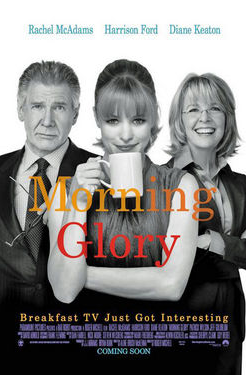
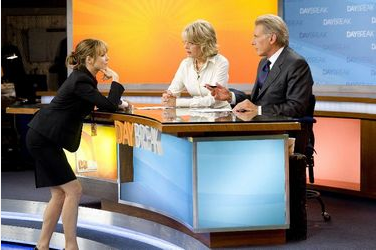 One of the big reasons I could never embrace the film is that I did not agree with its central message for a second. The movie seems to argue that the news should be dominated with trivial reports, and wacky stunts, like weathermen riding roller coasters, and anchorwomen sumo wrestling. It seems to think that a news program lowering its standards in order to get ahead in the ratings is a good thing. The closest thing to an antagonist in the film is the grumpy old anchorman, Mike (played by Harrison Ford, who has the best stone face and gravely voice outside of Clint Eastwood). Mike is a once-respected anchorman who once covered big stories and wars. Now his career is on the skids, and he finds himself hosting a fluffy last-place morning news show called Daybreak. When the show starts devoting more time to fluff pieces and soft journalism, he becomes upset, thinking that they should cover...well, real news. I remind you, this is the character we're supposed to be disagreeing with.
One of the big reasons I could never embrace the film is that I did not agree with its central message for a second. The movie seems to argue that the news should be dominated with trivial reports, and wacky stunts, like weathermen riding roller coasters, and anchorwomen sumo wrestling. It seems to think that a news program lowering its standards in order to get ahead in the ratings is a good thing. The closest thing to an antagonist in the film is the grumpy old anchorman, Mike (played by Harrison Ford, who has the best stone face and gravely voice outside of Clint Eastwood). Mike is a once-respected anchorman who once covered big stories and wars. Now his career is on the skids, and he finds himself hosting a fluffy last-place morning news show called Daybreak. When the show starts devoting more time to fluff pieces and soft journalism, he becomes upset, thinking that they should cover...well, real news. I remind you, this is the character we're supposed to be disagreeing with.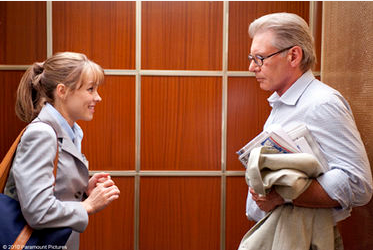 These changes in the program come about due to our heroine, Becky (Rachel McAdams), a chipper and plucky young woman who is charged with the task of saving the program before it gets canceled. She fires the old, creepy anchorman who has a foot fetish, and replaces him with Mike, thinking that alone will boost ratings, due to his history and status. When that doesn't work, she begins putting more stunt pieces on the show in a desperate attempt to boost ratings. This is seen as a good thing, but I couldn't get this nagging thought out of my mind that I was not buying what the movie was selling. It's true, Mike does finally get a big scoop by exposing a political scandal on live TV, but the movie doesn't consider it a happy ending until he finally gives in to Becky's point of view, and starts doing improvised cooking segments live on the air.
These changes in the program come about due to our heroine, Becky (Rachel McAdams), a chipper and plucky young woman who is charged with the task of saving the program before it gets canceled. She fires the old, creepy anchorman who has a foot fetish, and replaces him with Mike, thinking that alone will boost ratings, due to his history and status. When that doesn't work, she begins putting more stunt pieces on the show in a desperate attempt to boost ratings. This is seen as a good thing, but I couldn't get this nagging thought out of my mind that I was not buying what the movie was selling. It's true, Mike does finally get a big scoop by exposing a political scandal on live TV, but the movie doesn't consider it a happy ending until he finally gives in to Becky's point of view, and starts doing improvised cooking segments live on the air. It's not that I didn't like Becky, or McAdams' performance. The character is so gosh-darn spirited and sweet, it's impossible to hate her as a person, and McAdams brings a lot of charm. It was the message behind the character that did not sit well with me. Screenwriter Aline Brosh McKenna (The Devil Wears Prada) seems to be taking an attitude of "it's okay to sell out, as long as you get to keep your job". The movie also misses a lot of opportunities with the relationship that slowly builds between Becky and Mike. It's supposed to be sort of like the student teaching the grumpy old mentor how to adapt to modern times, and we're supposed to be happy when Mike finally sees things her way. But I wasn't. It felt like a cop out and a surrender, not acceptance on Mike's part.
It's not that I didn't like Becky, or McAdams' performance. The character is so gosh-darn spirited and sweet, it's impossible to hate her as a person, and McAdams brings a lot of charm. It was the message behind the character that did not sit well with me. Screenwriter Aline Brosh McKenna (The Devil Wears Prada) seems to be taking an attitude of "it's okay to sell out, as long as you get to keep your job". The movie also misses a lot of opportunities with the relationship that slowly builds between Becky and Mike. It's supposed to be sort of like the student teaching the grumpy old mentor how to adapt to modern times, and we're supposed to be happy when Mike finally sees things her way. But I wasn't. It felt like a cop out and a surrender, not acceptance on Mike's part.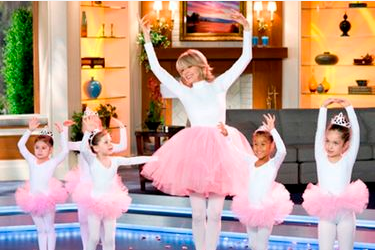 Morning Glory misses a lot of opportunities when it comes to human relationships, now that I look back on the movie. There are a lot of relationships that are hinted at throughout the film, but none that are fully developed. There's the competitive one between Mike and his diva co-anchor, Colleen Peck (an underused Diane Keaton). They feud on and off the set, but it never seems to lead anywhere. They just engage in empty-headed banter, and it never goes deeper than that. There's also a romantic love interest for Becky in Adam Bennett (Patrick Wilson), an employee at the station who worked with Mike in the past, and gives Becky some advice on how to handle him. I never detected any real chemistry between McAdams and Wilson. This surprised me, given that the director of this movie, Roger Michell, got a lot of chemistry out of his stars in his earlier romantic comedy, Notting Hill.
Morning Glory misses a lot of opportunities when it comes to human relationships, now that I look back on the movie. There are a lot of relationships that are hinted at throughout the film, but none that are fully developed. There's the competitive one between Mike and his diva co-anchor, Colleen Peck (an underused Diane Keaton). They feud on and off the set, but it never seems to lead anywhere. They just engage in empty-headed banter, and it never goes deeper than that. There's also a romantic love interest for Becky in Adam Bennett (Patrick Wilson), an employee at the station who worked with Mike in the past, and gives Becky some advice on how to handle him. I never detected any real chemistry between McAdams and Wilson. This surprised me, given that the director of this movie, Roger Michell, got a lot of chemistry out of his stars in his earlier romantic comedy, Notting Hill.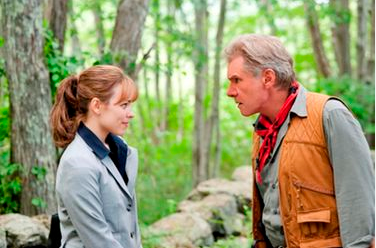
See the movie times in your area or buy the DVD at Amazon.com!






0 Comments:
Post a Comment
<< Home